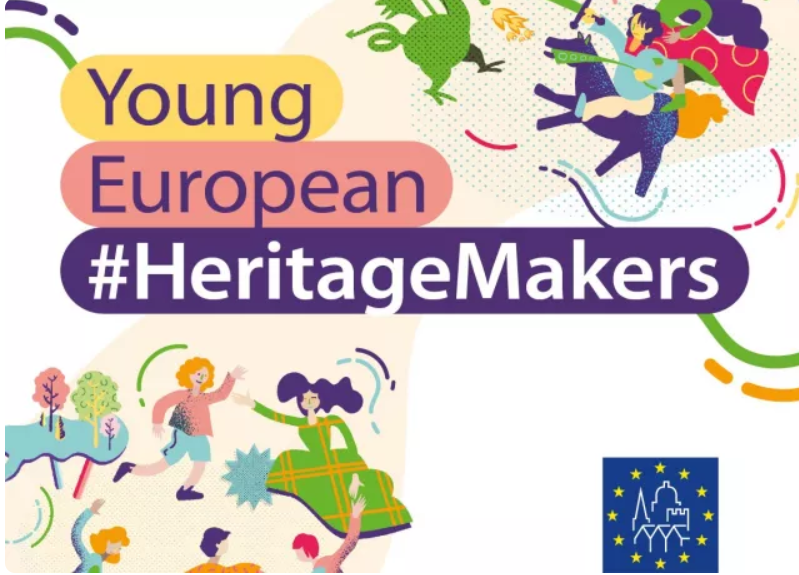Young European Heritage Makers is a competition for children and young people to encourage exploration, discovery and expression of their heritage!
From the Western Balkans, Montenegro and North Macedonia are participating in the competition. (If you are from another economy which is not participating and you want to join the competition, contact jep-ehd@coe.int and the organisers will get you in touch with your national coordinator.)
Read carefully the Mentors’ guidelines for participation before applying.
Children and young people play a crucial role in the future of heritage protection and promotion and are a precious source of creative ideas and contributions to the field of heritage in general.
Young European Heritage Makers is a competition for the young people of Europe. It is an opportunity for them to explore their surroundings, identify the most interesting parts of their heritage and present them to the rest of the world. This competition should encourage young people to understand the concept of heritage and express their views.
The objectives of the Young European Heritage Makers competition are:
- To collect experiences and stories of how children and young people understand the European dimension of their local heritage. This can include tangible heritage such as monuments and buildings, features of the natural landscape, or intangible heritage shared by their community, such as dancing, singing or local cultural traditions. Creative interpretations are very much encouraged.
- To identify and highlight the work of young people interested in heritage.
- To bring future #HeritageMakers into the spotlight and connect them with their peers from other parts of Europe.
Who are Young European Heritage Makers?
Any group of young people or young individuals who live in the participating countries, who are under 18 years of age at the time of submission and who are interested in observing, exploring and participating in the environment and heritage that surrounds them.
Entries are open to two age categories – age 6-11 and age 11-17 .
Only entries by groups are eligible to be selected for the prize. Individuals can submit their work, and it will be shared on the EHD website, but the initiative ultimately intends to encourage the development of shared heritage communities.
How to get involved in Young European Heritage Makers?
The European Heritage Days invites Young European #HeritageMakers to express their own vision of European Dimension, as well as which European values are recognised in their heritage sites.
The steps are simple:
Step one:
Organise an activity with a group of young people, in age categories 6-11 and 11-17 years old, under the theme Young European #HeritageMakers. The outcome of the activity should answer the question:
What is your European heritage?
Step two:
The outcome of the activity should be presented through either:
– a video of up to 5 minutes or
– a photo, painting, drawing, or other visual medium, accompanied by a description no longer than 800 words
Please keep in mind that the children should be the authors of the work as this is their moment to express themselves. The role of mentors is only to guide Young European #HeritageMakers through the exploration process.
Step three:
Upload your group’s work to the EHD dedicated page (form will be active from 1 September) with details about the participants. Once the national coordinator approves your work, it will be published on the EHD website.
Questions to help you during the exploration process:
- What does heritage mean to you?
- What do you know about European heritage?
- What story of Europe can you see in the heritage around you?
- What is the most interesting feature of your local heritage and is it unique to your cultural environment or shared with other countries?
- How do you present the story in pictures and words?
The role of mentors in Young European #HeritageMakers
Try guiding children towards the exploration of heritage rather than telling them what heritage is and what it is not. Always keep in mind that the aim of activity is to understand children’s perception of heritage.
Mentors are professionals involved in overseeing groups of children and young people, in youth organisations or schools and colleges. They can be also found in associations or organisations whose field of expertise is heritage or education (for example, museum or library education and outreach teams), and are involved with children and young people in their work. This might be youth organisations (such as Scouts), or local community groups, and will vary depending on where you live.
The role of a mentor is to identify groups of children interested in heritage, introduce them to their surrounding local heritageand make sure the activity is practised in line with the Council for Europe child safeguarding policy
.The Council of Europe “Listen – Act – Change Council of Europe Handbook on children’s participation for professionals working for and with children”, including new “Rome Strategy” (2022-2027), adopted by the Council of Europe Committee of Ministers on 23 February 2022, as well as the EU Strategy on the Rights of the Child and the European Child Guarantee
should be consulted before and during the delivery of the activities.
Please note that mentors, both individual mentors and organisations, should be trustworthy and have a right to work with children and young people in your country. Read the Council of Europe data protection policy.
The role of the mentor is just to frame the activity, not to intervene to the process of exploration of heritage by children and to their freedom to express themselves.
Discover the new Event ideas brochure! and follow the competition on Facebook and Instagram to get inspiration for activities.
IMPORTANT DATES!
1 September 2023 – 28 February 2024 – Organising activities and uploading entries
15 March 2024 – Evaluation at national level, selection of two national winners (one per age category)
April 2024 – Evaluation at European level
May 2024 – Announcement of the selected works and visit to Strasbourg for the selected ones in the 11-17 age group.

